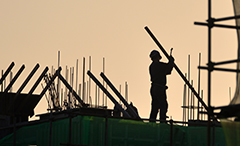Regulation puts eye on security cameras
2016-11-29
China Daily
Anyone who sets up surveillance cameras that result in the violation of others’ privacy may be fined a minimum of 1,000 yuan ($145), according to a draft ordinance made public by the Ministry of Public Security.
The ministry released the ordinance for public review on Nov 28.
Image-collecting devices are prohibited from being installed in places likely to result in the leak of private images, such as a hotel rooms, dormitories, public bathrooms or locker rooms.
Violations carry fines from 1,000 to 100,000 yuan.
Jiang Ming’an, head of the constitution and the administrative law studies department at Peking University, said there is an urgent need to protect the privacy of entities as well as individuals.
“I think it is time for legislators to make a privacy law to protect personal data. At present, the legal basis for privacy protection is mentioned in the Civil Law, with generalized provisions on the rights of names, pictures and reputation,” Jiang said, adding that a specific single law on privacy protection should be in place as soon as possible.
“The definition of privacy should be stipulated by law, and questions such as what violations should be defined as illegal under the law need to be answered in a statutory book,” he said.
Wei Jie, a lawyer at Jieqiang Law Firm in Beijing, said the draft regulation is a step forward for privacy protection. “We need to strike a balance between public interests and personal rights, which include privacy,” he said.
The draft ordinance requires a reasonable distance between a camera or video equipment and a household residence. It also includes clauses related to leaking and misusing personal images collected for public security purposes.
Regulations on the installation of cameras and the use of video data have been adopted recently by several governments at provincial levels.
Also on Nov 28, a regulation was published by the government of Anhui province, stipulating that surveillance cameras for public security must be installed in public places such as schools, medical establishments and public transportation vehicles.
Public security departments and government organizations that have approval from public security authorities are allowed to access information, according to the regulation.
Any person or entity that leaks video data or pictures will be held accountable, according to the regulation.
It also prohibits cameras from being installed in a financial institution where they can reveal personal data, as well as from places that could expose opinions, such as ballot boxes.

